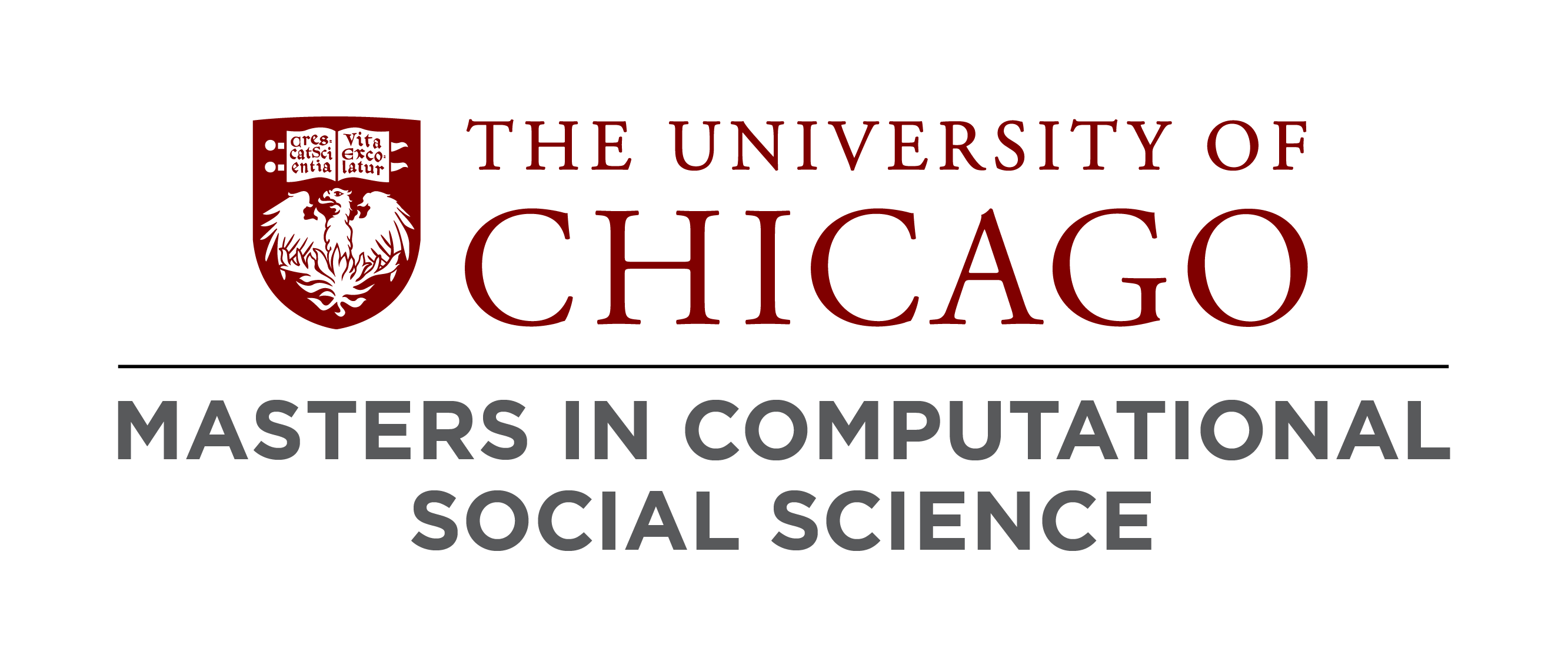MACSS General Curriculum
We seek to produce University of Chicago-trained social scientists, well versed in the most recent literatures of their discipline and ready to make important contributions by deploying cutting-edge computational research designs.
All MA students will complete the equivalent of 18 graduate seminars and write an MA thesis. Students take three – and no more than three – classes in each of the Fall, Winter, and Spring quarters, in each of their two years.
MACSS students have some required courses, but also a great deal of flexibility in their remaining course choices (for the MACSS-Econ curriculum see here):
The requirements below are for all MACSS students outside of MACSS-Econ. Students in MACSS-Econ should look at the MACSS Economics page for the curriculum they must follow.
In their first year, all MA students will complete:
- The Computational Math camp or the Econ Math camp and the Computing Fundamentals Boot Camp, which run for three weeks in August / September.
- A Computational Statistics placement exam and a Computing Fundamentals exam, offered at the end of the Boot Camps.
- A three-course core in Perspectives (Perspectives on Computational Analysis, Perspectives on Computational Modeling, and Perspectives on Computational Research), giving an overview of current research topics and methods in computational social science that results in a journal style paper produced as part of the Spring Quarter course of the sequence. We encourage students to utilize the core courses to think, reflect and try out potential thesis subjects.
- A three-course core computing sequence. This computing sequence provides our students with all the necessary computing skills to write their own programs, collect, process and scale their computational research workflows to run in on-premise computing clusters, as well as the Cloud.
- Three graduate social science electives that will vary, depending on the student’s prior training and intended disciplinary path.
- Weekly participation in the Computational Social Science Workshop.
- Minor exceptions: (1) students who do not place out on our statistics exam will take an introductory course in computational statistics instead of a social science elective in the Fall quarter; (2) students who need additional math for computational economics will take those courses before attempting graduate electives in economics; (3) students may take more advanced programming courses instead of the first two courses in our computing sequences, if they place out on a computer science placement exam administered in the September before the start of the Fall quarter.
In their second year, all MA students will complete:
- Three advanced courses in computational methods, drawn from any graduate department or professional school of the University.
- Three graduate social science electives.
- Three graduate courses that the student may select, from any UChicago department or professional school, where the student meets the minimum prerequisites.
- Weekly participation in the Computational Social Science Workshop.
- Students may take the MA Research Commitment once during the second year. This option allows students to allocate more time to their MA thesis. The course grade will be the one the faculty reader assigns on the final draft of the MA thesis, no matter when that paper is submitted. If students want additional course credit for working on their thesis project, they may register for independent study with a faculty advisor. The faculty advisor and student will form an agreement at the beginning of the quarter outlining the requirements for the student and what work the student must produce in order to earn a letter grade for the independent study.
Year 1 Sample Curriculum
*Students can take more advanced programming if they place out on the CS placement exam taken before the start of the Fall Quarter. For more information see the Summer Math Camp & Placement Exams page.
Year 2 Sample Curriculum
*Drawn from any graduate department or professional school at the University
**Can be any graduate course at the University where the student meets minimum prerequisites
Year 2 courses can be distributed as course scheduling allows; the above is just an example.
MA Thesis Project
We view the MA thesis as an integral component of your training in research design and conducting computational social science, and many students find it to be one of the most enjoyable aspects of the program. The MA thesis, typically 30 to 70 pages in length, will be written under the direct supervision of a UChicago faculty member.
Students have the option to choose between an academic or a professional thesis. The academic thesis gives students the opportunity to develop an original research project under the mentorship of a faculty member at the University, with the goal of producing an academic journal article-style paper in Computational Social Science. The professional thesis is an original work produced for a professional audience (e.g., policy analysis, market analysis report, software development of a new package). To learn more, see our MA Thesis Requirement on this page.
For anyone who is not a native writer of English, the University offers a writing-focused summer program that is remarkably comprehensive and very reasonable in cost. The course is designed to bring students’ English to the graduate level, and to help prepare them for academic and professional interviews after they graduate. The course will also make sure that students do as well as possible in their writing-intensive graduate seminars. More information is available on the University's English Language Institute website.
We also offer summer placement in labs for incoming computational psychologists or those doing lab-oriented research.
More information about academic requirements is available in the curricular policy.
Students with questions about program requirements and milestones should contact Sabrina Biggus (sbiggus@uchicago.edu) MACSS Student Affairs Administrator. Students may also contact Brett Baker (bbaker@uchicago.edu), Associate Dean of Students in the Social Sciences, and Amanda Young (amanday@uchicago.edu), Director, Graduate Student Affairs in UChicagoGRAD.
 THE UNIVERSITY OF CHICAGO
THE UNIVERSITY OF CHICAGO

